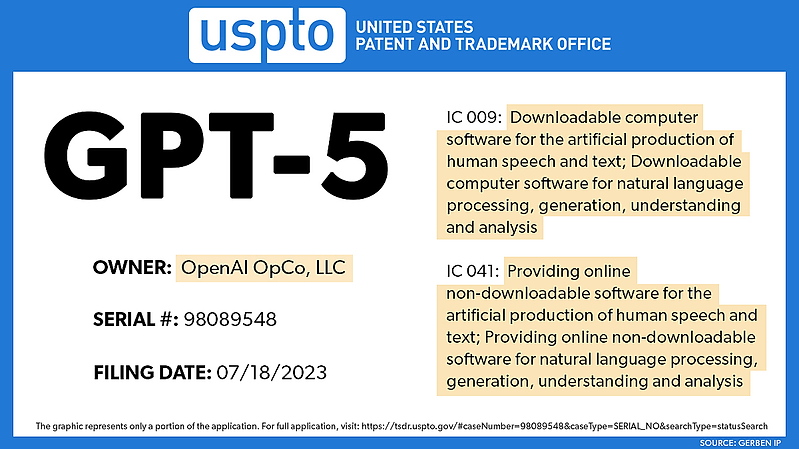OpenAI files trademark for GPT-5, just a few months after its predecessor GPT-4. A game-changer in natural language processing might roll out soon.
OpenAI Files Trademark Application for GPT-5, Mere Months After GPT-4
OpenAI has officially filed a trademark application for “GPT-5” with the U.S. Patent and Trademark Office (USPTO) on July 18. The application has passed initial scrutiny and now awaits examination for approval by the relevant authorities.
The trademark filing provides a glimpse into what could be the next evolution of language models. GPT-5, if realized, promises to be a large language model (LLM) with a robust focus on natural language processing, generation, understanding, and analysis. Notably, it is expected to go beyond its predecessors by boasting remarkable speech comprehension and generation capabilities.
Hot New Features in the Wraps
According to the disclosed details, GPT-5 will encompass a wide range of functionalities, including seamless language translation, cutting-edge speech recognition, and the ability to generate both text and speech with astonishing fluency.
The model is projected to possess advanced learning capabilities, enabling it to analyze, classify, and respond to complex data.
The timing of this filing comes amidst ongoing discussions within the machine learning community concerning the potential risks posed by generative AI models. Some experts and scholars have urged caution, advocating for restrictions on the development of large AI models.
Nevertheless, OpenAI, renowned for its previous successes with ChatGPT and GPT-4, appears undeterred and resolute in pushing the boundaries with GPT-5.
A Surprising Move for OpenAI
Earlier indications from OpenAI had suggested a primary focus on refining GPT-4, leaving the emergence of GPT-5 uncertain. However, the recent trademark application contradicts these notions.
OpenAI’s CEO, Sam Altman, took the opportunity to address this speculation during the “Beijing Wisdom Source Conference” in June, stating that GPT-5’s arrival is not imminent.
While tech companies often file trademarks for concepts that may still be in the early stages of development, the application has garnered considerable attention. Analysts and enthusiasts are eagerly awaiting official announcements from OpenAI to shed light on GPT-5’s expected release date and potential capabilities.
The research community anticipates groundbreaking advancements from GPT-5, building on the successes of its predecessors. In particular, there are high hopes for improved multi-modal capabilities, with GPT-5 expected to process various types of data, including voice and video, beyond its current text and image processing capabilities.
More Accurate Generation Anticipated
OpenAI’s internal adversarial authenticity assessment showed notable progress, with GPT-4 scoring significantly higher than the latest GPT-3.5 model. This bodes well for addressing concerns related to “illusions” and “biases” that may impact practical applications of these models.
The unveiling of GPT-5 remains eagerly anticipated, with the tech world holding its breath to witness how this ambitious language model will redefine the boundaries of AI and shape the future of language processing and understanding.

